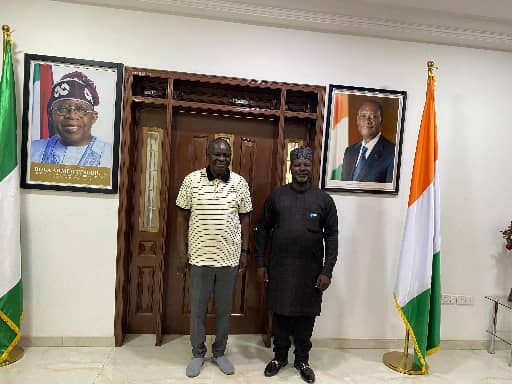
CÔTE D’ IVOIRE: SUCCCESS STORY OF A SIMMERING COAST
By Maik Ortserga
Côte d’Ivoire, a country located in West Africa, has a robust trading past dating back to centuries. Côte d’Ivoire became a French colony in 1893. Since that time many changes have taken place. These changes affect every one of its populations, from the poor villager earning his life on the cocoa or coffee plantations to the educated Ivorian hurrying through a city street to his office.
Historically known as Ivory Coast, the country rose to become an economic powerhouse in West Africa through the production of coffee and cocoa during the 1960s and 1970s, then it experienced an economic crisis that lasted for twenty-five years. The capital was changed from Abidjan to Yamoussoukro in 1983, while the state’s name changed from Ivory Coast to Côte d’Ivoire in 1986. But violence didn’t wait to show its fangs in the once peaceful country.
Leadership succession crises engulf the country following the death of President Felix Houphouet-Boigny in 1993 creating an unstable political atmosphere. A failed coup attempt in 2002 led to a full-blown civil war.
Ivorians came to be under siege again and only the bullets talked clearly between 2010-2011 when presidential election led to another crisis as incumbent president Laurent Gbagbo refused to acknowledge his defeat, triggering violence.
It took the UN Operation in Côte d’Ivoire (UNOCI), in 2011 to help restore legitimacy and stability along with French forces after violence broke out in 2010.Unlike other African countries like Nigeria, Ivorians have since tried to use their heads to learn their history in order not to follow the same historical path to their doom. A steady struggle continued within the silence that wove itself around Côte d’Ivoire during its trying moments.
With its financial territory in the death throes, how this resilient nation has navigated itself out of the bugs and cobwebs of economic woes into an unstoppable spiral of steady growth, to become the world’s leading cocoa producer; recording one of the fastest and most sustained economic growth rates in Sub-Saharan Africa for over ten years, is what made the reporter of The Economist Magazine said “the success of Ivory Coast is “Africa’s best kept secret.”
However, as noted by the Barcelona writer Carols Ruiz Zafon, “A secret’s worth depends on the people from whom it must be kept.” My thought on Côte d’Ivoire’s success story is rooted in a combination of factors, including post-conflict economic recovery, diversification beyond cocoa, and a focus on trade facilitation and investment.
The country has experienced strong economic growth since the end of the 2011 political crisis, with average annual growth exceeding 7% between 2012 and 2023. This growth has been driven by a combination of factors, including increased cocoa production, diversification into other sectors like cashew processing and services, and most importantly, the return of peace and stability.
To start with, the end of the 2010-2011 civil war and subsequent political stability have been crucial for economic recovery and growth. This stability has allowed for a rebound in economic activity, leading to strong growth rates and a resurgence in investor confidence. War has been declared on poverty and its by-products, illiteracy and ignorance. Ivorian coffee and cocoa farmers who have been using time-worn methods as their forebears, have learnt new ways of increasing production.
Côte d’Ivoire remains the world’s largest cocoa producer today, it has been actively diversifying its economy. Although modern industry is in its infancy, it is growing by the day. Remarkable development has begun, this includes developing the cashew processing industry, expanding the services sector, and increasing investment in other areas like agriculture and industry. In addition, to thriving cottage industries, home crafts which have existed in the region since ancient times have a world-wide reputation for quality.
Côte d’Ivoire has equally made efforts to improve its trade infrastructure and streamline customs procedures, making it a more attractive destination for investment. The country has done this by implementing trade facilitation projects and partnering with international organizations to improve trade efficiency.
Between 2012 and 2023, Côte d’Ivoire’s economy grew at an average rate of 7.1% per year in real terms, making it the second-fastest growing economy in Africa. The country has also maintained relatively low inflation and a shrinking fiscal deficit.
Today, Côte d’Ivoire has become a regional economic hub, attracting investment and talent from other West African countries. It plays a central role in the Economic Community of West African States (ECOWAS) and is a popular destination for people from other member countries.
But it has not been an easy road for this leading star of Africa. Despite its economic progress, Côte d’Ivoire still faces challenges, including high poverty rates and income inequality. However, the country is working to address these challenges through social programs and policies aimed at promoting inclusive economic growth. While challenges remain, the country has demonstrated its ability to overcome adversity and build a resilient and sustainable economy. No doubt, “The success of Ivory Coast is Africa’s best-kept secret.”
It is this success story that recently clanked the door open for a meeting between the President of the Society for Peace Studies and Practice (SPSP), Mr. Nathaniel Msen Awuapila, with the Ambassador of Côte d’Ivoire to Nigeria and ECOWAS, His Excellency Kalilou Traore, on April 5, 2025, at the ambassador’s official residence in Asokoro, Abuja. The meeting focused on discussing peace consolidation in Africa, specifically addressing current peace and security challenges across the continent. The SPSP President cherished the diplomatic engagement and cooperation in addressing Africa’s peace and security challenges with the Ambassador. The fact that the SPSP’s mandate focuses on promoting peace studies and practice, explains its efforts in seeking collaboration with the Côte d’Ivoire government on peacebuilding initiatives.
The two leaders have likely found a habitable space in the discourse on security issues affecting Africa, including terrorism, conflicts, and social unrest and the future of this collaboration seems bright.



